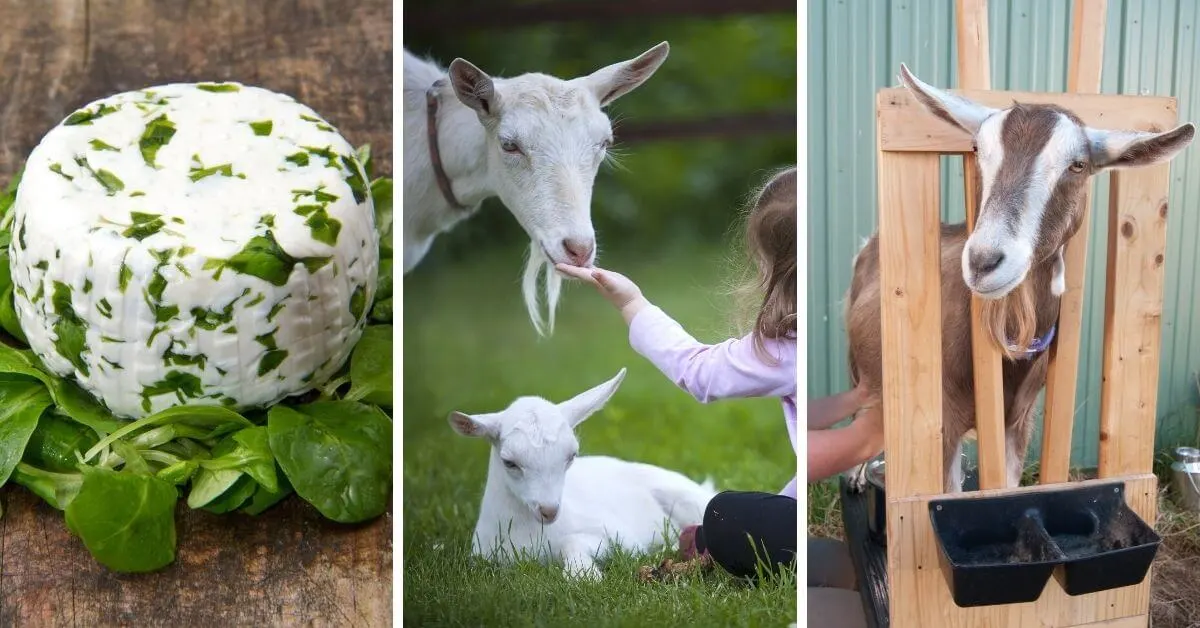Updated May 8, 2023
For pregnant women who love goat cheese, the big question on their mind is probably “Can I eat goat cheese while pregnant?”
The answer to this question is a little complicated.
There are some things you need to take into account before making a decision.

In this blog post, we will explore the pros and cons of eating goat cheese while pregnant, and help you make the best decision for your own health!
Can I Eat Goat Cheese While Pregnant?
Yes, pregnant women can eat goat cheese that is pasteurized. Goat cheese made from raw milk should not be consumed if you are pregnant.
One of the main considerations when deciding whether or not to eat goat cheese while pregnant is the risk of listeria.
Listeria is a type of bacteria that can cause food poisoning, and it can be especially dangerous for pregnant women.
Pregnant women are 10 times more likely to get sick from listeria than the general population, and it can even lead to miscarriage, premature labor, premature birth, or stillbirth.
However, the risk of getting sick from listeria is very low if you only eat pasteurized goat cheese.
Pasteurized cheeses have been heated to a high enough temperature that all the harmful bacteria have been killed.
Some healthcare providers are OK with pregnant women eating hard goat’s cheese that has not been pasteurized.

Hard cheeses including hard goat cheeses have a low moisture level which can make it hard for listeria and other harmful bacteria to grow easily.
However, our OB/GYN Dr. Doug Penta, MD believes strongly that the risk of food poisoning from consuming unpasteurized cheese is too high.
So, if you’re looking to enjoy some goat cheese while pregnant, your best bet is to stick with the pasteurized variety.
Of course, even pasteurized goat cheese is not completely risk-free.
Cheese of any kind is a good source of fat and calories, and pregnant women need to be careful not to overdo it on either of those things.
Eating too much fat can lead to weight gain, and eating too many calories can cause problems with blood sugar levels.
If you’re going to eat goat cheese while pregnant, be sure to do so in moderation.
Being a pregnant woman and cravings go hand in hand.
If you are craving a snack of creamy spreadable cheese and live in the United States, you are in luck, since almost all cheese and cheese spreads sold here are made from pasteurized milk.
The FDA does not allow the sale of raw milk which limits its use in dairy products like cheese.
Always check the labels on your cheese to be sure it is made with pasteurized milk.
Can you eat chèvre goat cheese while pregnant?
Yes, you can eat pasteurized chèvre goat cheese while pregnant.
Chèvre is fresh goat cheese.
Pregnant women are 10 times more likely to get sick from listeria than the general population.
But the risk of getting sick from listeria is very low if you only eat pasteurized goat cheese.
Can I have feta cheese while pregnant?
Feta cheese is typically made with unpasteurized milk, so it is not recommended for pregnant women.
Pregnant women are more susceptible to foodborne illnesses, and feta cheese has a high risk of contamination with listeria.
If you are pregnant and craving feta cheese, look for a pasteurized variety made with pasteurized milk.
Is it safe to eat goat cheese while pregnant?
Eating goat cheese while pregnant is generally safe as long as the cheese is pasteurized.
Pasteurized goat cheeses have been heated to a high enough temperature that all the harmful bacteria have been killed.
It is important to be sure not to eat goat cheese made with raw milk.
Cheeses made with raw milk are more likely to be contaminated with harmful listeria bacteria that could harm your unborn baby.
Can I eat soft cheeses while pregnant?
Pregnant women are more susceptible to foodborne illnesses, and soft cheeses have a high risk of contamination with listeria.
If you are pregnant and craving soft cheese, look for a pasteurized variety made with pasteurized milk.
You want to avoid eating kinds of cheese like Brie.
What is surface-ripened goat cheese?
Surface-ripened goat cheese is a type of soft cheese that is not safe for pregnant women to eat.
Surface-ripened goat cheeses are typically ripened using bacteria that occur naturally on the surface of the cheese.
Even if the surface-ripened goat cheese is pasteurized it is still considered unsafe to eat if you are pregnant.
Is soft goat cheese pasteurized?
Yes, soft goat’s cheese is typically pasteurized.
Pasteurized cheeses have been heated to a high enough temperature that all the harmful bacteria have been killed.
So, if you’re looking to enjoy some soft goat cheese while pregnant, your best bet is to stick with the pasteurized variety.
What are the benefits of eating goat cheese while pregnant?
Goat cheese is a good source of fat and calories, and pregnant women need to be careful not to overdo it on either of those things.
So, if you’re going to eat goat cheese while pregnant, be sure to do so in moderation.
Goat cheese is also a good source of protein and calcium.
Pregnant women need extra protein for the development of the baby, and calcium is important for the development of the baby’s bones and teeth.
What are some pasteurized goat cheese brands?
Some examples of pasteurized goat cheese brands include Montchevre, Capriole, Cypress Grove, Chevre Noir.
We love Trader Joe’s selection of goat cheeses.
They offer several different types of goat cheese.
Can I eat goat cheese on pizza while pregnant?
Pizza is typically made with unpasteurized mozzarella cheese, which is not safe for pregnant women to eat.
However, in the United States, almost all commercial cheeses are pasteurized.
The best thing to do if you are planning to have pizza is to ask the restaurant if the mozzarella cheese is pasteurized.
If you making pizza at home use only pasteurized cheeses on your pizza.
Be sure to cook your pizza until it is hot and at least 165 degrees.
So, if you’re craving pizza while pregnant, your best bet is to make your own at home with pasteurized goat cheese.
That way, you can control what goes into your pizza and be sure that the cheese is safe to eat.
We love to make goat cheese, pear, bacon, and arugula pizza at home.
That seems to satisfy all my food cravings at once.
What are some other ways to enjoy goat cheese while pregnant?
Goat cheese can be enjoyed in a variety of ways.
Some other ideas for enjoying goat cheese while pregnant include:
- Adding it to salads
- Spreading it on crackers or bread
- Making a Goat Cheese & Honey Crostini appetizer
- Including it in omelets or quiche
- Using it as a pizza topping (with pasteurized mozzarella)
- Make a Goat Cheese & Strawberry Tartine for breakfast or dessert.
- Use goat cheese in a sauce
What cheeses to avoid while pregnant?
Pregnant women should avoid unpasteurized cheeses, as they have a high risk of contamination with listeria.
Cheeses to avoid while pregnant include:
- Unpasteurized soft cheeses like feta, Brie, Camembert, queso Blanco, queso fresco, panela, Roquefort, Chevre Noir
- Unpasteurized processed cheeses like American cheese, Velveeta
- Unpasteurized hard cheeses like Parmesan.
- Pregnant women should also avoid mold-ripened soft cheeses like Brie and Camembert.
These types of cheeses have a higher risk of contamination with listeria.
Can I eat Laughing Cow cheese while pregnant?
Yes, you can eat laughing cow cheese during pregnancy.
The good news is laughing cow cheese is made with pasteurized cheese and is considered safe to eat while pregnant.
Can I eat goat cheese while breastfeeding?
Yes, you can eat goat cheese while breastfeeding.
Goat cheese is a good source of fat and calories, and breastfeeding women need to be careful not to overdo it on either of those things.
So, if you’re going to eat goat cheese while breastfeeding, be sure to do so in moderation.
Goat cheese is also a good source of protein and calcium.
Breastfeeding women need extra protein for the development of the baby, and calcium is important for the development of the baby’s bones and teeth.
Symptoms of Listeria infection:
- flu-like symptoms
- fever
- diarrhea
- headache
- stiff neck
- vomiting
- muscle pain
- convulsions
- loss of balance
List of foods not to eat when pregnant:
In general, you should avoid eating unpasteurized cheeses, raw meat or fish, deli meats, and unpasteurized juices.
- Foods that are not pasteurized- certain types of cheese like soft cheeses, Brie, soft blue cheeses, etc.
- Certain types of fish- shark, swordfish, anything high in mercury
- Raw eggs
- Undercooked meats, lunch meats, deli meats.
- Hot foods that are not “hot”, avoid hot foods that have been sitting out without a warming source. Same for foods that should be eaten cold. If there is no ice or refrigeration source keeping the food cool, take a pass.
- Caffeine- soda, chocolate. (Limit your caffeine to less than 200 mg a day)
- Herbal Teas (There are so many ingredients in herbal teas so it is best to simply avoid them. Green tea is OK.)
Final Thoughts
All things considered, the risks of eating goat cheese while pregnant are relatively low.
However, it’s important to make sure that you only eat pasteurized goat cheese, and that you do so in moderation.
If you have any concerns about eating goat cheese while pregnant, be sure to talk to your doctor or midwife.
Your healthcare provider can help you make the best decision for your own health and the health of your baby.
It is best to avoid all unpasteurized dairy products during pregnancy.
Thanks for reading, and we hope this has been helpful!


